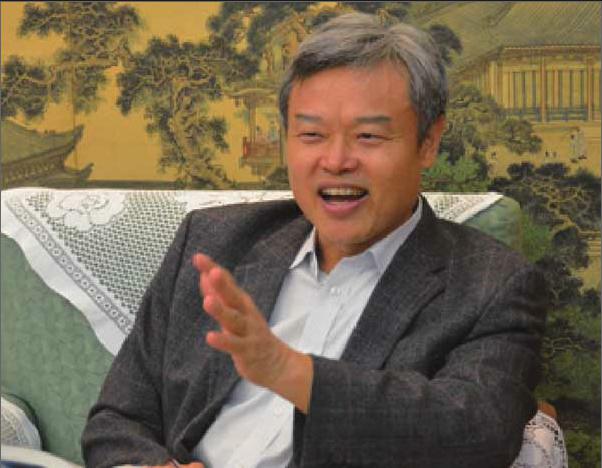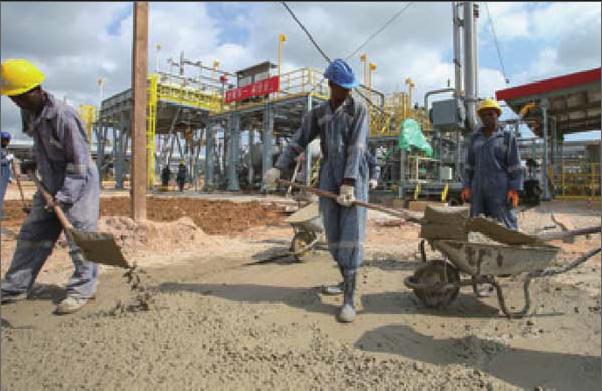From Tazara to Today
2016-12-26


Beijing Review: What would you say about investing in Africa, especially in Tanzania?
Lu Youqing: Tanzania has five prominent comparative advantages to develop business. First, it is called East Africas gateway to the Indian Ocean due to its 1,000-km coastline. From the north to the south of the coastline, there are abundant spots for building ports.
Second, Tanzania has abundant natural resources. There are large reserves of natural gas, petroleum and helium, which are yet to be explored. It also has 44 million hectares of arable land, which means 1 hectare arable land per capita, 14 times the figure in China. At least one third of the land remains to be tapped. Plus, Tanzania is not short of labor. Its under-35 group accounts for 70 percent of the total population.
The political and social stability is another highlight for investors. Political parties, reli- gions, tribes and clans in the country live in peace and harmony. There is no terror threat or pirate attack. Border conflicts are also rare.
Tanzania has maintained stable economic growth. It has laid a foundation for the development of agriculture and a variety of industries including mining, infrastructure, tourism, telecommunication, logistics, manufacturing and financial business. The currency exchange rate is also stable. [The Tanzanian shilling (TZS) is the local currency;$1 equals 2,176.94 TZS.]
Last but not least, Tanzania has a sound international reputation. As one of the earliest independent African countries, Tanzania strongly supported the cause of national independence of other African states, which gave it regional clout. Also, Tanzania can adjust its foreign policy to adapt to global changes. It gives priority to developing economic ties with the rest of the world and plays an important role in intergovernmental organizations, participating in international affairs. Tanzania is the only state that enjoys membership of both the East African Community and the Southern African Development Community.
How are Chinese companies faring in Tanzania?
There are a large number of Chinese companies and according to the Tanzania Investment Center, the governments one-stop agency for investors, by 2015, Chinas direct investment in Tanzania had reached $6.62 billion. China is the second largest investor in Tanzania, after Britain.
Chinese enterprises are investing in a wide range of businesses, especially in construction, textiles and telecommunication, which are less dependent on natural resources. Of all foreign enterprises in Tanzania, Chinese companies are creating the largest number of jobs. By the end of 2014, Chinese companies had created around 150,000 jobs in Tanzania. Another 350,000 Tanzanians are engaged in trade with China.

Chinas technologies and designs are growing in Tanzania. For example, the Nyerere Bridge [connecting Dar es Salaams central business district to the district of Kigamboni] was built by the China Railway Group Ltd. and became operational in April. The bridge, named after the first president of Tanzania, Julius Kambarage Nyerere, is the largest cable-stayed cross-sea bridge in subSaharan Africa.
Tanzanias National Backbone Optical Broadband Network, contracted by China International Telecommunication Construction Corp., is running as the countrys first national information superhighway, filling the gap in commercial cable network in Tanzania.
Chinese companies also attach importance to establishing sound relations with the local community. During Chinese and Tanzanian festivals, Chinese companies organize celebrations with Chinese and Tanzanian employees. They are also undertaking corporate social responsibility projects to meet local needs.
What challenges do Chinese enterprises face in Tanzania?
It is a long way for Chinese enterprises to achieve successful transformation and upgrading of their investment models.
The Chinese embassy is playing an active role in facilitating bilateral economic cooperation. We invite large enterprises to do business here, set an example for small companies and create competition. We try to select the large enterprises instead of letting all in and creating disorder.
Large-scale projects are playing a key role. A ceramics factory with an annual production capacity of 25 million square meters of tile, a plasterboard factory with an annual capacity of 10 million square meters, and a steel mill with an annual capacity of 1 million tons have started construction or operation. A coal-electricity-iron integration project with a total investment up to $3 billion and a cement factory with an annual capacity of 3.5 million tons will start construction soon.
We encourage Chinese companies to form industrial parks. Many Chinese companies are situated along the trunk roads connecting Dar es Salaam with Morogoro and Mtwara. Those companies located close to one another naturally formed industrial parks that are convenient to manage and help one another. Its also easier for the Tanzanian Government to provide necessary services for the projects.
We have also helped set up associations for Chinese business people based on different industries, regions and interests, so that they can organize themselves and protect themselves. The embassy shoulders the responsibility of providing consular protection for local Chinese.
Last but not least, the embassy holds at least two seminars on laws and regulations every year to make sure the Chinese business people conduct their business within the law.
Chinese companies must be aware of the local circumstances. Chinese investors and workers should adapt to local laws, culture and customs. Although public security is good on the whole, Chinese companies should be alert for dangers. Life in Tanzania might be very hard for some Chinese. They should be mentally prepared before they come to Tanzania.
There are 54 countries in Africa and they are widely different, with different locations, political systems, economies and cultures. Many Chinese investors usually ignore these differences. Chinese companies must study these diversities well before they go to Africa.
How does Chinese cooperation help Tanzanias economic development plans?
The Tanzanian Government has formulated five-year plans and the Tanzania Development Vision 2025 development program, combining mid- and long-term planning. Integrating resources through plans and setting targets can motivate people. China is doing its part in sharing with Tanzania its experiences on how to govern a country and promote economic development.
To build Tanzania into a moderately de- veloped country [with a per-capita average GDP of $3,000] by 2025 is a reachable goal. Tanzanias National Five-Year Development Plan [2016/17-2020/21] gives priority to industrialization-related projects and supports them in terms of infrastructure construction, investment programs, budgetary arrangements and industrial policies.
Tanzania will also prioritize cooperative projects with China and include bilateral cooperation, which works under the mechanism of the Forum on China-Africa Cooperation, into its national economic plans. This will not only provide guidance for the cooperation, but also make full use of both countries advantages —Tanzanias rich resources and Chinas investment. Chinas project-contracting teams, with their technology, management skills and credibility, are promoting mutually beneficial results.
What benefits do Chinese companies bring to the locals?
We are offering our ideas, professionalism and quality products which work in local conditions. The technologies provided by Chinese companies are cost-effective. The goal of producing cost-effective yet quality products will make companies innovate.
